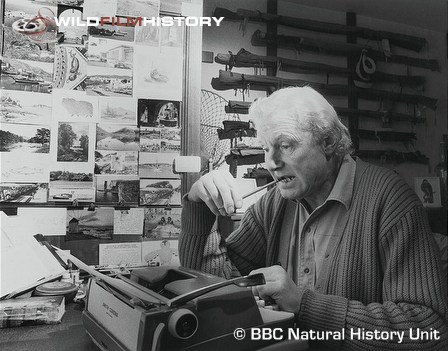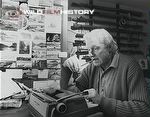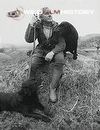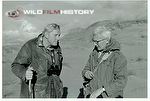Hugh Falkus

An acclaimed wildlife filmmaker and naturalist, Hugh Falkus was born in Surrey in 1917. Entering into wildlife filmmaking from an extraordinarily rich and varied past, Hugh's background had seen him working as an actor, playwright, broadcaster, fisherman, amateur cricketer and film producer. During World War II he became a fighter pilot and after a crash landing in France had managed to escape from his prisoner of war camp, returning home 10 days before Germany surrendered.
World War II over, Hugh began experimenting in the world of cinematography, making a number of documentary films for cinema and television, including Drake's Island (1950). Tragedy struck during the filming of his 1952 feature Shark Island in Ireland, when Hugh's boat hit a rock and went down. Hugh was the sole survivor, losing his crew and second wife, Diana.
After completing the film and donating the proceeds to the family of the deceased, Hugh withdrew to Eskdale and pursued his interests as a naturalist and sportsman. Over time, he began to work with the BBC Natural History Unit. Possessing a special talent for writing film scripts, Hugh was often hired by Chris Parsons to adapt any purchased films and to voice various narrations. He lent his voice to the entire series of The Undersea World of Jacques Cousteau, and numerous episodes of the Animal People programmes.
Hugh again turned his hand to filmmaking after a chance meeting with Nobel Prize winning animal researcher Professor Niko Tinbergen. The start of a long and highly productive partnership, the pair initially collaborated on two projects for Peter Scott's Look series, The Sign Readers (1964) and Beachcombers (1965). The winter of 1968 saw the pair release the highly acclaimed Signals for Survival - a powerful exposition of animal communication, it won the television documentary category of the Italia Prize in 1969.
Hugh continued his success with the acclaimed The Riddle of the Rook (1972) and in 1974, The Tender Trap, an award-winning appraisal of carnivorous plants. In 1982 he was awarded the Cherry Kearton Medal by the Royal Geographic Society for his wildlife work.
Remembered by many for his angling achievements, Hugh was a champion fly fisherman and author of several bestsellers on the subject. Many of his famous works remain in print, and his 1962 offering, Sea Trout Fishing (1962) is widely credited with revolutionising the sport.
Hugh died on 30th March 1996.





